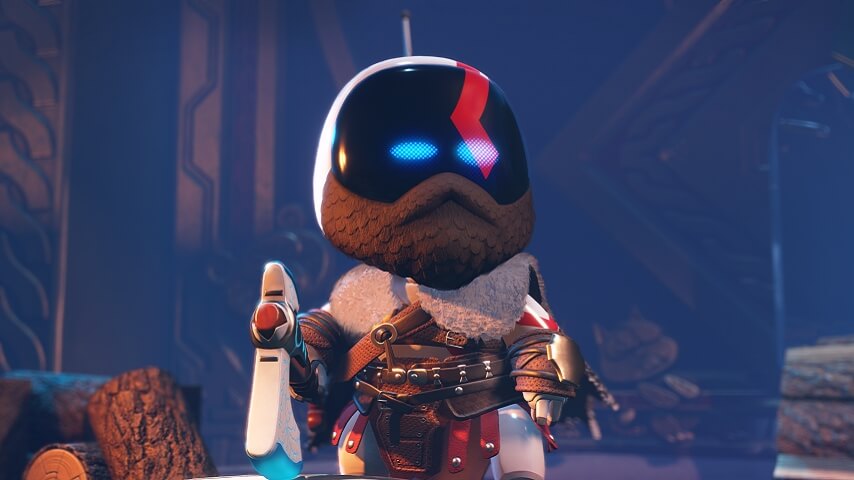Game Theory: Astro Bot is one of the most joyful games of 2024
Sony's latest PlayStation 5 exclusive is a dose of bright, bold gaming magic—spiced with a heavy dose of PlayStation nostalgia

Every Friday, A.V. Club staffers kick off the weekend by taking a look at the world of gaming, diving in to the ideas that underpin the hobby we love with a bit of Game Theory. We’ll sound off in the space above, and invite you to respond down in the comments, telling us what you’re playing this weekend, and what theories it’s got you kicking around.
One of the many great things about Astro Bot—Sony’s gorgeous, whimsical, incredibly fun new 3D platformer—is that it’s very easy to tell if you’re going to like it. Simply install 2020’s Astro’s Playroom, the free pack-in title for the (required) PlayStation 5, play (or re-play) it, and if, after you’ve cruised through its four or so hours of brightly colored, energetic, inventive running and jumping, you catch yourself thinking “God damn I wish there was more of this,” well: Insert $60 into the nice machine.
If that sounds a little reductive, it might just be because you haven’t played the Astro games yet. (Understandable, since the series has been confined to either PSVR or PS5 exclusivity for as long as its been around.) Created by internal Sony group Team Asobi, these games are almost pure joy, frequently in bite-sized form—but they save their inventiveness for moment-to-moment play, not top-level design. The premise of the new one remains “ain’t broke, don’t fix” familiar, for instance: Your crew of adorable little robots gets its PlayStation 5-shaped spaceship hijacked by gooey aliens, and heroic Astro has to navigate 80 levels to get both his ship, and his friends, back. If that self-referential element turns you off, meanwhile, then you can probably stop reading now: Among other things, Astro Bot is a love letter to the PlayStation brand, including more than 100 “V.I.P. Bots” for you to save, patterned after PlayStation games ranging from the obvious to the obscure. (Where else in all of gaming can you have Kratos and Nathan Drake kick it with Tir McDohl from 1996’s Suikoden?) This element either works for you, or it doesn’t: We’ve got enough kid in us to still be delighted to save a Bot and realize it’s Aegis from Persona 3, or Solid Snake. It’s a cheap thrill, but a consistent one.
What’s not debatable is Astro Bot‘s commitment to refining the 3D platforming template popularized by Sony’s rivals over at Nintendo way back in the day. Astro’s base moveset is a lot simpler than some plumbers of his ilk—he’s got a jump, a hover, a punch, and a charge-up spin-move, and that’s it—but Team Asobi makes up for it by coming up with fascinating new powers to gift him to give the game’s various levels their irresistible identity. (Along with one of our favorite soundtracks in games, once again delivered by Kenneth C.M. Young; this is a headphones-mandatory title.) To pick a single favorite, one level gifts Astro with a seamless shrinking ability that lets you immediately drop yourself to mouse size and then back again, allowing you to sneak inside nooks and crannies, battle giant versions of the game’s roster of enemies—and then, at the press of a button, blow back up to full size to stomp your foes. Games have had shrinking as a power before, but the beauty of Astro Bot is how effortless it makes it all feel: Bouncing between the two layers of reality is instant, smooth, and fun, allowing you to explore everything those powers allow you to do. And it’s just one of several such powers the game hands out as its levels go.
That spirit of play infuses everything in Astro Bot. The game is rarely complex—except in totally optional bonus levels, which push players’ platforming skills to the test—but you can always tell when someone on the team had a good idea for something players could do with a particular power, because they immediately tossed it in. (Usually hiding one of several collectibles strewn around the level.) Meanwhile, the PS5 gets put to the test for once with this rare instance of console exclusivity, producing some of the brightest, most expressive worlds we’ve ever punched our way through. It’s a game constantly exploding with beautiful colors, propulsive sounds, and, yes, the gentle kick of nostalgia. Some levels go even harder on the latter aspect, gifting you abilities wielded by heroes from games like God Of War, Ape Escape, or Uncharted. (Is it weird to see Astro sporting a gun and mowing down bad guys with colorful orbs for bullets? Kinda!) But even if you don’t like one particular level’s gimmick—swimming in 3D games, waiting for a really fun implementation for 30 years now and counting—Astro Bot is so committed to variety that something better is bound to be along in a minute.
What bars for entry are here are mostly external: That price point may be a sticking point, for instance, because while Astro Bot is certainly longer than its free predecessor, clocking in at about 15 hours for a straightforward playthrough, it’s also a hell of a lot pricier. If you don’t like the basic gameplay model here—if running, punching, climbing, and hovering aren’t burnt into your DNA—then the core simplicity of the play might leave you feeling a little put off, despite the strength of its execution. And we wouldn’t blame anybody for rejecting the game on the grounds of it being pure hagiography: We might find ourselves helplessly charmed by seeing little Lego-esque figures dressed up as Crash Bandicoot or Leon Kennedy, but it’s an incredibly aggressive piece of mascot work, undeniably. Like we said: Go back and play the free one; see if it leaves you craving more of its simple, plentiful joys—and if it does, be grateful that that “more” has now arrived.